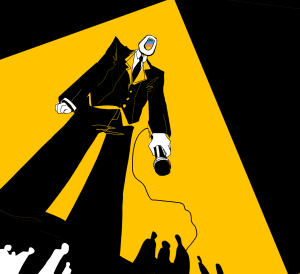After working at Kent State University and Ohio State University, Dean Michael Mason is now the Interim Dean for First Year Students in Undergraduate Studies at Case Western Reserve University. As interim dean, he works with students and faculty to make sure the first year experience goes smoothly for everyone. The Observer sat down with Dean Mason and discussed his background and his role at CWRU.
Check out the soundbyte at the end of the article to get an exclusive online look into this conversation!
Victoria Robinson: How long have you been working at Case Western Reserve Univeristy?
Michael Mason: It has been about a year now. I first came to CWRU in June of 2011 and I was the Assistant Director of First Year Student Academic Affairs. At the time, Julie Amon was the dean, so I was working for her. Since she resigned from here and took a job at Rutgers University, I have held the title.
VR: How did you become involved at CWRU?
MM: I have been in higher education since 2006, when I started my master’s program at Kent State University. I went there for a Master’s in Higher Education Administration and while I was there, I started doing academic advising as my graduate assistantship. For two years, I was an adviser for what they call their “Exploration Program,” which was essentially made up of students who hadn’t decided on majors. That was kind of my main interest when I started in higher education and academic advising, because I really like working one-on-one with students and helping them figure out what they want to study and what they want to do.
So after I graduated, I started job searching and found a job at Ohio State University in their college of engineering. I had a couple of different roles. I was an academic advisor in the college for undecided engineering students who knew they wanted to do engineering, but didn’t know which kind of engineering they wanted to do. And then the other half the time, I was a coordinator of a residential learning community that was focused on green engineering.
I did that for three years and then after that time, I got to the point in my career where I realized I wanted to expand my scope a little bit. I enjoyed working with engineering students, but, when I worked at Kent State, I worked with students in a full range of student interest and I wanted to get back to that.
I wanted to work with a wider population. I had always worked with first year students, so I really like the first year population, specifically because I think it’s a really exciting time in college. Everything is new, everything is exciting, and there’s just a lot of, from my perspective, growth and a lot of positive things that happen from the beginning to the end of the first year and it’s a cool thing to be a part of.
I knew I wanted to stay focused on first year students, but I wanted to widen my scope so I started looking at different positions and I came across this one here. I was familiar with CWRU because, going to school at Kent State, I was familiar with Northeast Ohio and the reputation of CWRU.
Some people in my master’s program were doing their graduate assistantships here, and I had always heard good things about it. One of the other things I did at Ohio State was organizing the honors program for the engineering college, so I was working with students doing honors theses and there was a graduation with honors in the engineering program. I kind of liked the concept of working with high ability students that were looking for ways to really get the most out of their undergraduate experience and I know CWRU really was known for having that kind of population.
In the end, all of those factors combined and I saw this job and was really excited about it and was fortunate enough to get it.
VR: What all does your position as dean entail?
MM: It really involves working at the intersection of faculty and students, so I work with students in a variety of ways. I work with them in large groups like plenary sessions, etc. I helped plan and facilitate all of the stuff that freshmen experienced over the summer with registration, all those information seminars, and putting together the For Your Information (FYI) guide.
Overall, I work with students as a large group all the way down to individual one-on-one appointments and everything in between. Sometimes it’s a matter of working with someone who, as an individual, is experiencing challenges and needs a little help and some guidance. Other times it is working individually with someone who is trying to clarify what they want to study or has ideas about something they want to achieve, but they’re not sure where to go. I help them get connected with other campus resources.
Other times, it’s thinking big picture about what are some things that we, either as an office of undergraduate studies or in partnership with other offices and within student affairs or academics, can do to improve the overall first year experience. So it’s a spectrum and levels within that spectrum. Then there’s the faculty side, too.
Part of what I do is serving as kind of the main point of contact within our office for faculty who are teaching with first year students, especially with the SAGES first seminars advisers and instructors. I facilitate the training workshops that happened over the summer with the first seminar advisers and I facilitate update meetings with them to help keep them advised of what is going on as far as policies. I bring people together to share information about the best practices for working with students and advising students.
I’m just there to address any questions advisers have about something particular that is going on with an advisee, for example, how best to answer their question.
VR: Do you have a favorite part of working as a dean?
MM: It’s hard to say what I enjoy more because I enjoy working with both faculty and students for different reasons. I will say I do really like the individual one-on-one interactions that I have with students and the same could be said for faculty. I like talking with faculty about their classes, their advisees, not that I dislike any of the larger group stuff.
It’s just for me, I try to, as much as I can, maintain a balance between the more administrative things that I do and having the opportunity to sit down and interact with students in a supportive way.
VR: What is it about one-on-one that you enjoy more than larger groups?
MM: Even though I’m not a faculty member, I consider myself an educator; I educate people in different ways, maybe non-traditional ways. When I have the opportunity to sit down with a student and get to know them and they get to know me, there’s a lot more potential for me to have an impact on them. It’s also informative to me when I’m thinking about larger picture issues because I need to understand what the actual student experience is like.
When I have the opportunity to sit down and talk with a student, whether it’s good, bad, or somewhere in the middle, those are informative. They can be inspirational, they can be revealing, they can be a lot of different things, but for me, I feel a greater connection to the students when I have the opportunity to actually get to know them.
I’ve advised students and I know how important, if you’re going to be effectively advising students, you really have to know them. You have to know their interests, you have to know their goals, and really understand who they are and where they want to go.
VR: What’s your best memory since you got to CWRU?
MM: One of the things that I really liked doing was being a facilitator of the Emerging Leaders Program last spring. I really enjoyed getting to know all the students in the program and having the opportunity to, outside of my office and the traditional walls of the university, get to do some fun things, and watch students get excited about doing projects that were directly impacting the community.
It’s nice to have those kinds of experiences that supplement what you do on a day-to-day basis because it re-energizes you and I think, for me, it was a lot of fun. I would have liked to do it again this fall, but the timing of it didn’t work out, but I hope to get back into it.
VR: Are there any difficulties that come with being a dean of undergraduate studies?
MM: The challenge is trying to maintain that balance between all the different responsibilities that you’re dealing with. There may be days and weeks at a time where I’m really focused in on a particular project or the week is really heavy with meetings and things like that. At some points, you have to look for ways to get reconnected with the student population whether it’s going to a residence hall and doing programs or going to study breaks and hanging out for the evening. I think the biggest challenge is trying to balance everything.
I think another challenge actually has been to get students to see me as something other than an authority figure. I think that there are a lot of connotations that come along with the title “dean,” and what I really want students to know about me is that my main responsibility and goal here is to help them get the most out of their experience here at CWRU. I want students to realize that they can come to me for anything – large or small – and I am here to support them. I don’t think students always see me in that light.
VR: How does working at CWRU compare to when you worked at Kent and Ohio State?
MM: It’s just a much more connected environment. Ohio State obviously is at the opposite end of the spectrum when it comes to size and Kent’s probably somewhere in between. I’d say what really makes CWRU different is just that when you’re dealing with a smaller population of students and a smaller administrative structure and a smaller faculty group, it makes establishing relationships much easier to do.
When I was at Ohio State, working in the college of engineering, I would rarely, if ever, have conversations with or interact with the director of residence life or one of the vice presidents for student affairs or any of those kinds of people. Now I see and I communicate with them here on a regular basis. I know almost the entire residence life staff that works with first year students here.
You just get a really good feeling when you’re walking across campus and you regularly see faces that you recognize. It just makes it feel like a really close-knit community and that’s what a lot of students are seeking, it’s what a lot of faculty members are seeking, and it’s a lot of what we at Student Affairs are seeking. That’s not to take anything away from Ohio State or Kent, but I think just the size and the way that we structurally work together just makes it feel like a much more cohesive unit.














